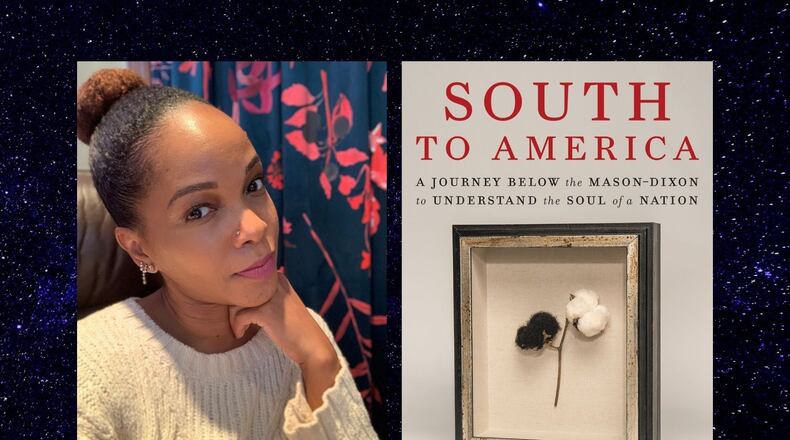“South to America” by Imani Perry is an ambitious and provocative collection of essays that attempts to squash any lingering stereotypes of a monolithic South by examining the complexities and nuances of the region and illustrating how its race relations have shaped the nation.
A professor of African American studies at Princeton University, Perry brings a keen insight to the endeavor informed by dual perspectives. She was born in Birmingham, Alabama, and identifies as Southern. But she grew up in Chicago and Cambridge, Massachusetts, and lives in Philadelphia, so she’s been afforded the kind of clarity only distance can provide.
Most of her essays focus on a single city or area — Appalachia, Louisville, Nashville, the Lowcountry, New Orleans. And she takes an omnivorous approach to her scholarship, weaving together threads of history, religion, commerce, education, tourism, pop culture and personal experience to tell her stories.
Some of her essays are intimate and experiential, taking the reader inside the home of a prominent collector of African American art in Savannah, for instance. Others take a long view, like the one on Atlanta.
Spoiler alert: Perry unleashes some tough love on our fair city.
“I do have a lot of fondness for Atlanta,” she assured me, speaking on the phone last week from Philadelphia. “In fact, I thought about moving there six or seven years ago.” Her essay, titled “King of the South,” may hold some clues as to why she didn’t.
“Culturally speaking, Atlanta is the bright star of the South that we steadily watch, even if with disdain,” she writes. “Atlanta is an in-the-flesh Disney World, a spectacle of American consumption and ambition. It is not, as some are wont to say, the ‘Black New York.’ Shops close early, public transportation is minimal, there’s something quaint about its boastfulness.”
At first glance, Perry’s essay appears to focus on low-hanging fruit, the kinds of things outsiders are quick to associate with the city: Coca-Cola, strip clubs, hip hop. But that’s her point. The essay is about image, and so is Atlanta.
“It’s a city in which branding is really important,” she told me. “I’m fascinated by how people think of Coke as a Southern drink, (when) ALL soft drinks are Southern. But it’s because of the power of the imagery of Atlanta as THE city that represents the South.”
Her essay points to the city’s name, derived from Atalanta, the fleet-footed goddess who couldn’t be captured by a man but who was ultimately seduced by golden apples.
“Even the name is about this mythical aspiration, right?” Perry said. “And it connects to the larger history in the sense that, you know when Atlanta had the slogan ‘The City Too Busy to Hate’? That wasn’t exactly true. There are some aspirations that have in some ways papered over the complicated history of the place … It goes back to what (W.E.B.) Du Bois was talking about more than 100 years ago, this mythology of accumulation and wealth and property attainment — it always, always cuts two ways. The places that shine always cut both ways because there are always people that suffer for it.”
The reality of what Perry is talking about comes into sharp relief when her essay drops some sobering statistics: 40% of Black households in Atlanta have incomes less than $50,000; 27% of Blacks have college degrees; 25% of Blacks own their own homes.
“Atlanta has this imagery as a kind of panacea for black folks … yet, it’s still this profoundly unequal city,” she said. “There’s all this prosperity, but there’s a great deal of poverty and a lot people who have been there for multiple generations who have been locked out of the prosperity of the city. There’s an identity to the city that it’s inclusive, and there’s a reality that a lot of the abundance of the city isn’t wholly inclusive or shared.”
One of the things Atlanta and the South gets right, said Perry, is that it’s generally more integrated than other parts of the country.
“Black and white people feel more comfortable with each other in the South,” she said. “(It’s) integrated in terms of moving through space, friendships, talking to people. It’s just unequal. There’s a difference. And that’s what is important to me about telling the story of the South.”
Perry will present an author talk 7 p.m. Feb. 15 at the Atlanta History Center, 130 W. Paces Ferry Road, Atlanta. Tickets are $10-$25. For details call 404-814-4400 or go to www.atlantahistorycenter.com.
Suzanne Van Atten is a book critic and contributed editor to The Atlanta Journal-Constitution. Contact her at svanatten@ajc.com and follow her on Twitter @svanatten.
About the Author
The Latest
Featured


